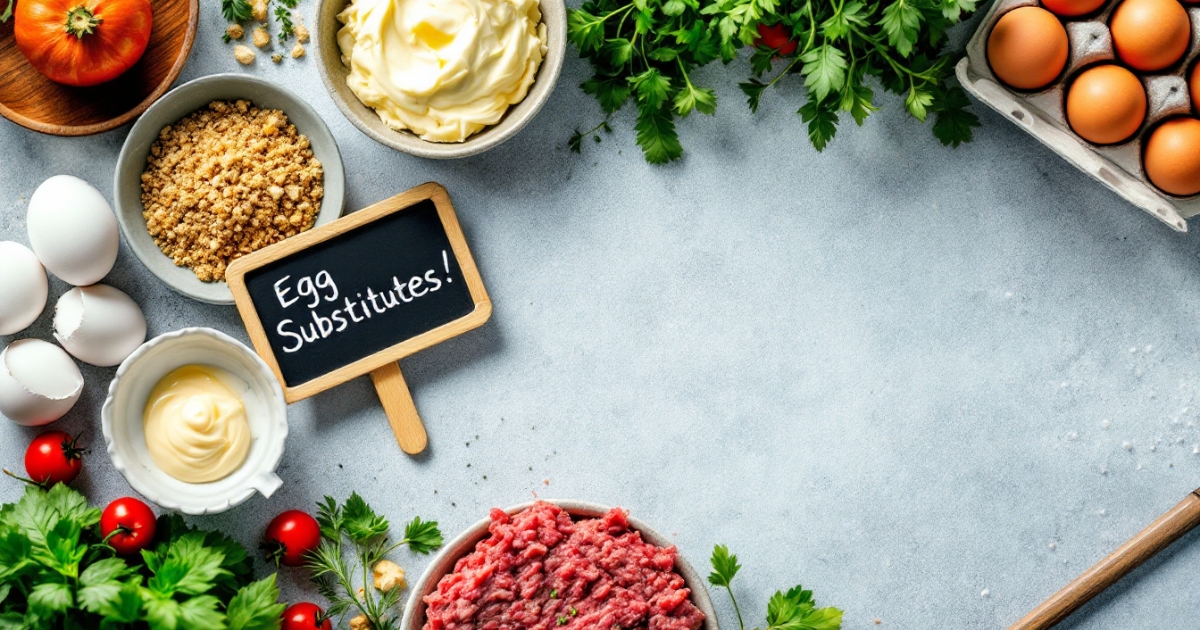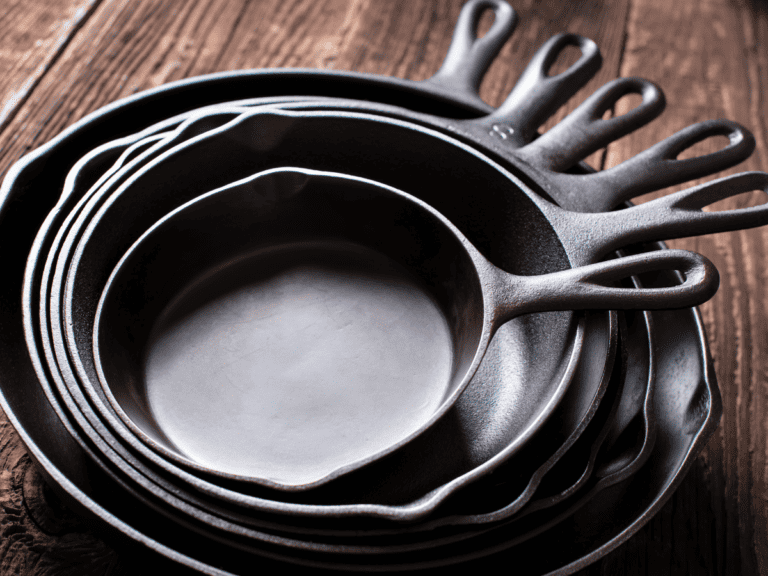No Yolks Allowed: A Chef’s Guide to Egg-Free Meatloaf Recipes
Let’s Take a culinary adventure through the world of egg substitutes for meatloaf, sprinkled with a dash of nutrition. We’re about to explore different healthy possibilities for the many egg substitutes that bring unique flavors and benefits. If your looking for the perfect egg substitute for meatloaf let me be your guide, it’s all going to be ok.
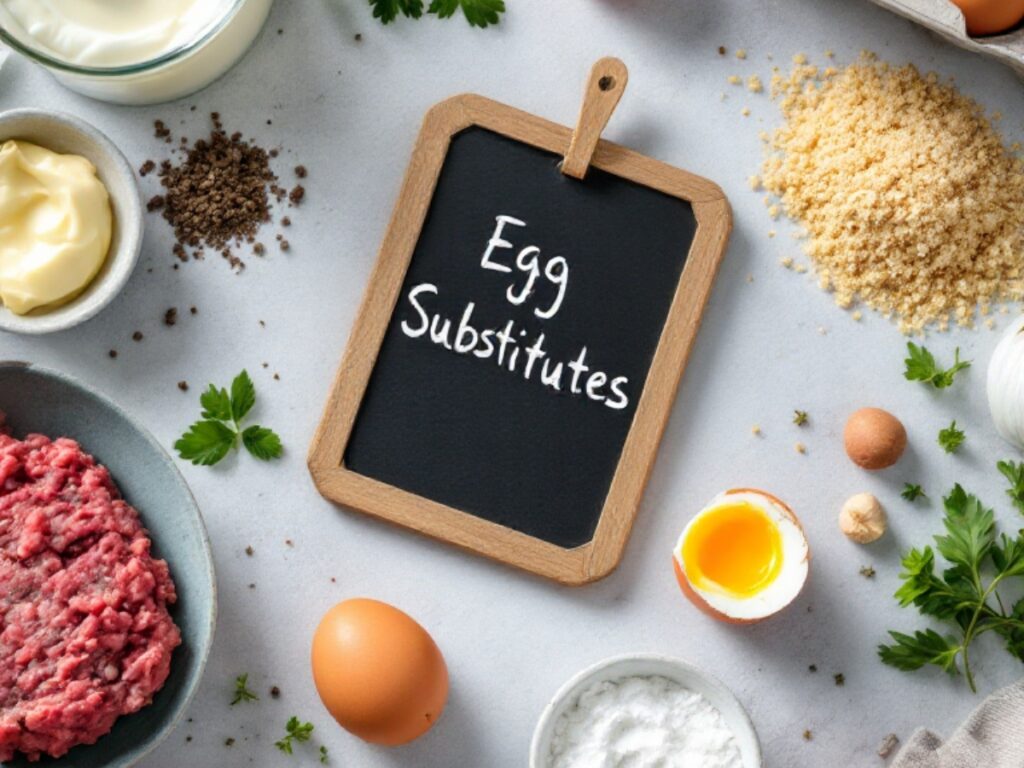
A Chef’s Meatloaf Revolution
Are you looking for the best egg substitutes around? It’s easier than flipping a pancake!
Most of the alternatives lurk right there in your pantry or local grocery store. And what makes a good substitute, you ask?
Well, it’s all about balance—something that brings moisture, binds the ingredients, and adds flavor to your ground meat.
It’s not just about swapping eggs; it’s about enhancing the dish and ensuring you make a delicious meatloaf instead of a science project.
Oh, The magical world of egg substitutes. Whether you’re diving into culinary experimentation or navigating dietary restrictions, I’ve got your back.
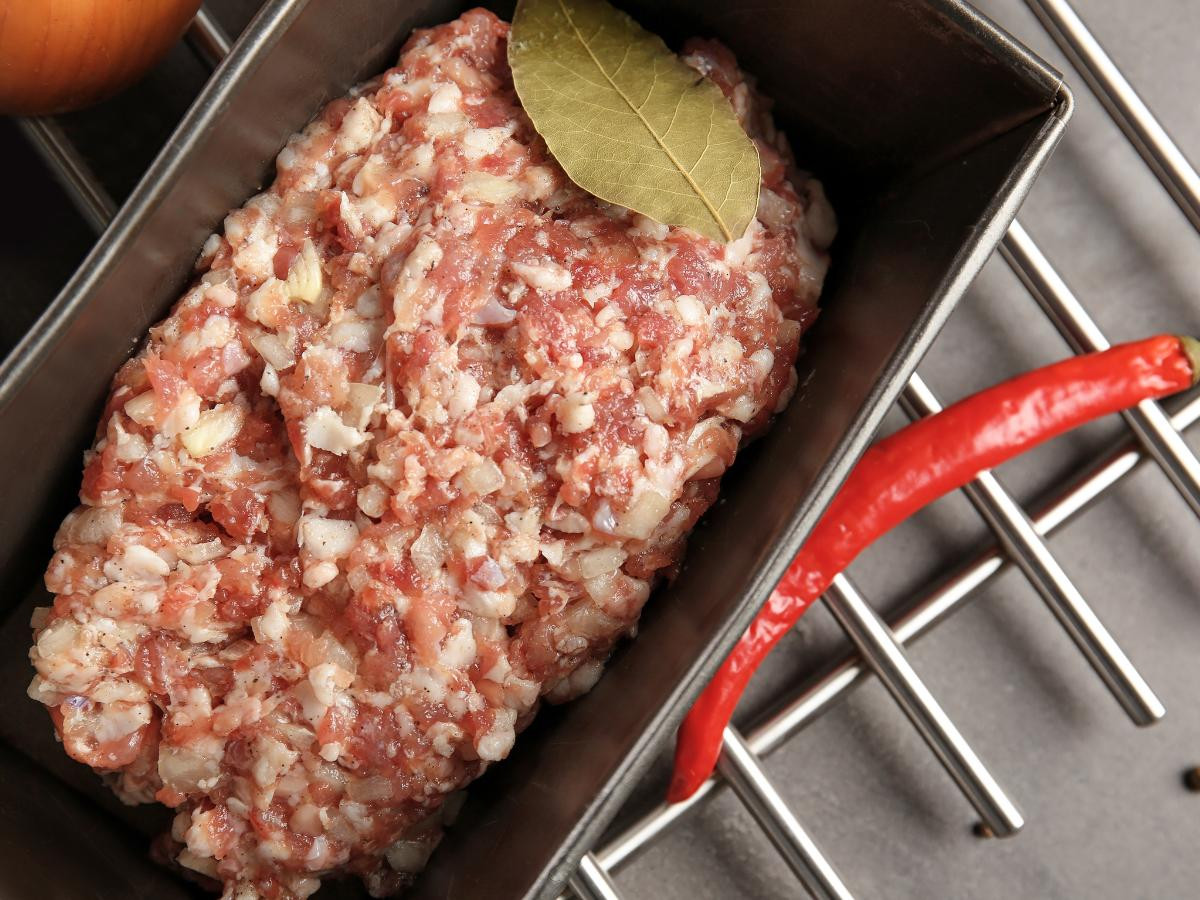
Why substitute in the first place? Dietary restrictions, allergies, or a desire to explore new flavors and textures drive the need for egg substitutes.
And the good news? You don’t have to sacrifice taste or texture. You might discover a new favorite twist on an old classic.
With the growing awareness of nutritional choices, finding healthier alternatives is a culinary adventure. Imagine a meatloaf that satisfies your taste buds and packs a punch of nutrients.
Whether boosting fiber, incorporating plant-based proteins, or infusing your dish with vitamins, the possibilities are as vast as the culinary landscape.
Let’s jump into the flavorful journey through the world of egg substitutes for meatloaf—where the kitchen becomes a playground, and every dish is an opportunity for culinary innovation.
Table of Contents
Why Are Eggs Added To Meatloaf?
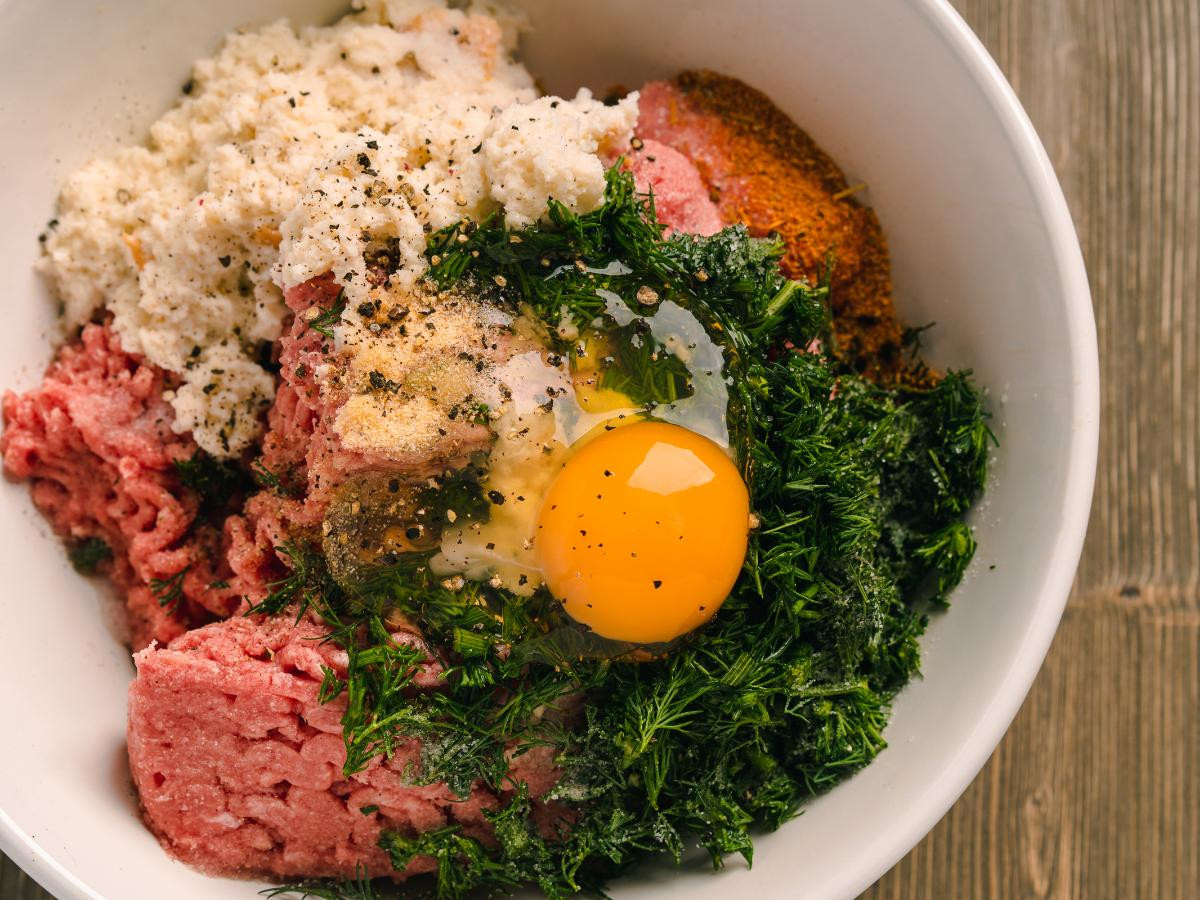
Eggs play a crucial role when cooking meatloaf by serving as a binding and moisture-retaining agent. Here’s a quick breakdown of what eggs do, like what you see in most meatloaf recipes.
1. Binding Agent
– Eggs act as a binder, holding the ingredients together and preventing the meatloaf from falling apart during cooking. The proteins in the egg yolk coagulate when heated, creating a network that binds the ground beef with the other components of the meatloaf.
2. Moisture Retention
– Eggs contribute moisture to the meatloaf, preventing it from becoming dry and crumbly. The water content in eggs turns into steam during baking, helping to keep the meatloaf moist and tender.
3. Texture Enhancement
– The proteins in eggs also contribute to the texture of the meatloaf, giving it a firm yet tender consistency. This texture is essential for a well-formed and sliceable meatloaf.
4. Flavor and Color Enhancement
– Eggs can enhance the overall flavor and color of the meatloaf. The Maillard reaction between amino acids and reducing sugars during cooking contributes to the meatloaf’s appealing color and savory flavor.
5. Leavening Agent
– In some meatloaf recipes, eggs can act as a leavening agent, helping the ground beef rise slightly during baking forming a soft but firm loaf. This can result in a lighter and fluffier texture.
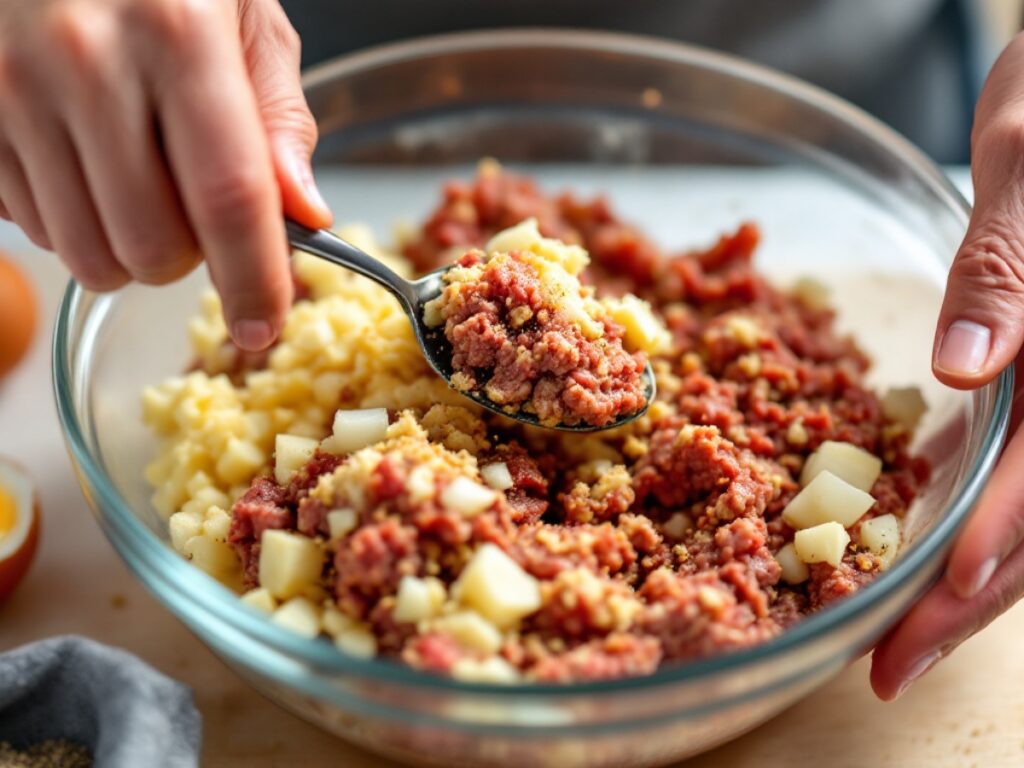
While eggs play a significant role in traditional meatloaf recipes, various egg substitutes are available for those with dietary restrictions or preferences.
These substitutes aim to replicate eggs’ binding and moisture-retaining functions, ensuring that the meatloaf maintains its structure and deliciousness even without using eggs.
Popular egg substitutes include yogurt, pureed fruit, flax egg and chia seeds, olive oil, mashed banana, avocado, and crushed crackers. Each substitute brings unique qualities, allowing for flexibility in meatloaf preparation.
What To Look For In an Egg Replacement?
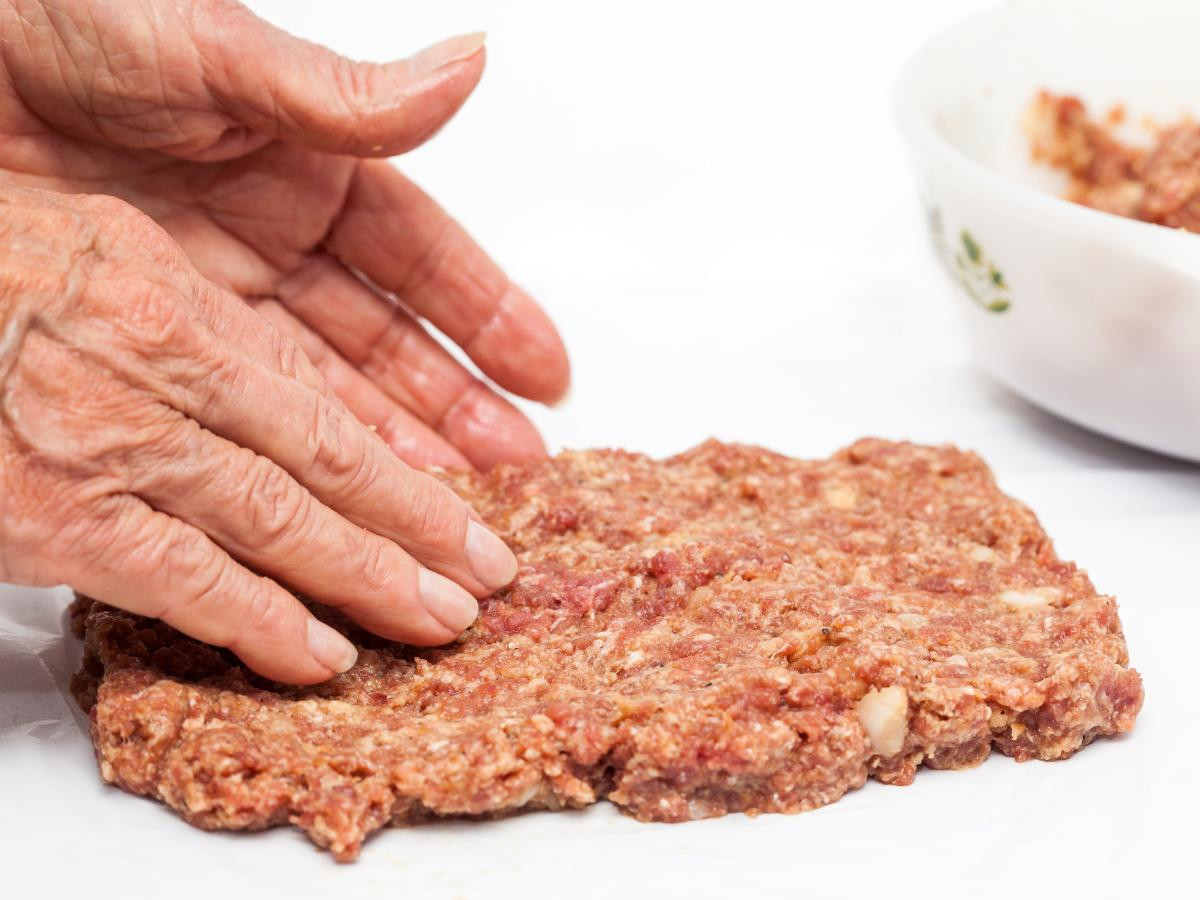
What are you in the mood for?
When selecting a healthy egg substitute for meatloaf, it’s essential to consider ingredients that mimic eggs’ binding and moisture-retaining properties. Here are key factors to look for in a great egg substitute:
1. Binding Properties:
– A good egg replacement should act as an effective binding agent, helping to hold the ingredients together. Look for ingredients that create a cohesive structure, preventing the meatloaf from crumbling.
2. Moisture Content:
– Eggs contribute moisture to the meatloaf, keeping it tender and preventing it from drying out during cooking. Choose an egg substitute that adds or retains moisture to achieve the desired texture.
3. Neutral Flavor:
– Opt for egg replacements with a neutral flavor or one that complements the other ingredients in the meatloaf. Avoid strong flavors that might overpower the dish.
4. Compatibility with Other Ingredients:
– Consider how well the egg replacement will blend with the other components of the meatloaf. The goal is to find a substitute that enhances the overall dish without altering its fundamental characteristics.
5. Texture Enhancement:
– Eggs contribute to the texture of the meatloaf by providing structure and a pleasing mouthfeel. Look for substitutes that contribute to a similar texture, ensuring the meatloaf is not too dense or too crumbly.
6. Allergen Considerations:
– If you or your intended audience have specific dietary restrictions or allergies, choose an egg replacement that aligns with those needs. Common allergens include eggs, dairy, and gluten.
7. Nutritional Content:
– Consider the nutritional profile of the egg replacement. Some substitutes, such as flax seeds, chia seeds, or mashed bananas, may bring additional nutrients to the table, contributing to the overall healthfulness of the dish.
8. Ease of Use:
– Select an egg replacement that is easy to incorporate into your meatloaf recipe. Some substitutes may require additional preparation steps, so choose one that fits seamlessly into your cooking process.
Popular egg substitutes for meatloaf include mashed potatoes, potato starch, yogurt, chickpea flour, flax egg and chia seeds, mashed banana, avocado, and silken tofu. Experimenting with different substitutes allows you to tailor the eggless meatloaf to your preferences and dietary needs while maintaining its essential qualities.
What Can You Use As an Egg Substitute for Meatloaf?
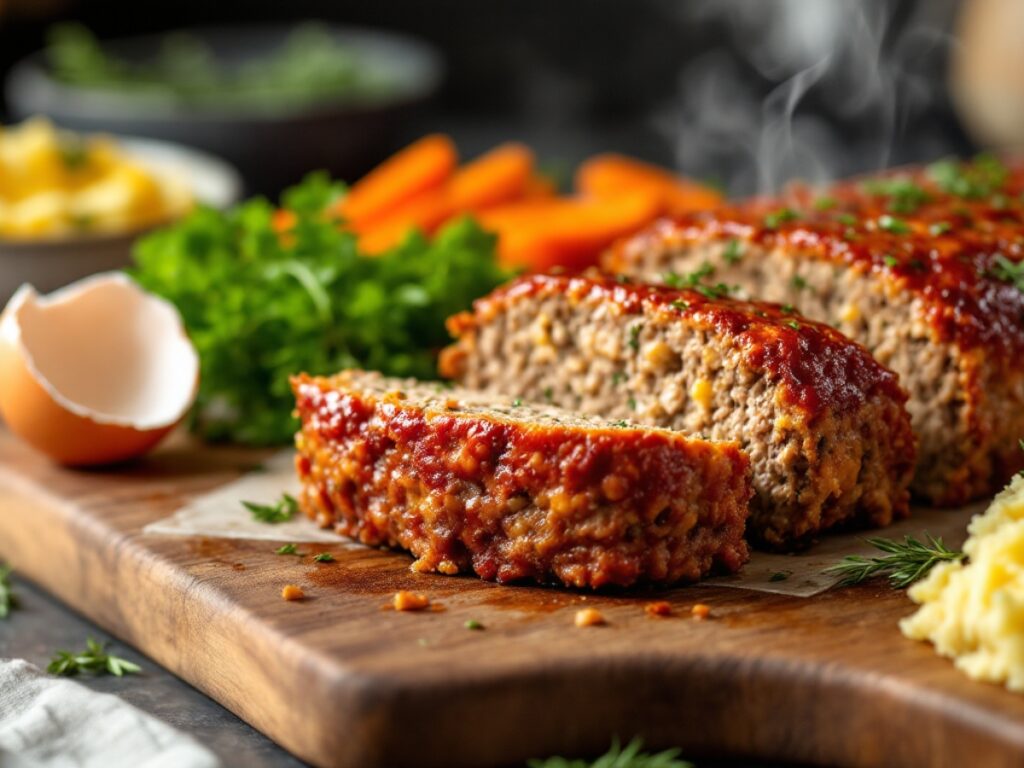
What can you use as an egg substitute for meatloaf, you ask? Fear not, as we navigate various options, each offering unique qualities to ensure your meatloaf stands tall, moist, and rich flavor, even without the traditional binding power of eggs and egg yolk.
Let’s uncover a world of possibilities that will redefine your meatloaf game and elevate your culinary prowess.
1. Mashed Potatoes: A Wholesome Hug in Every Bite
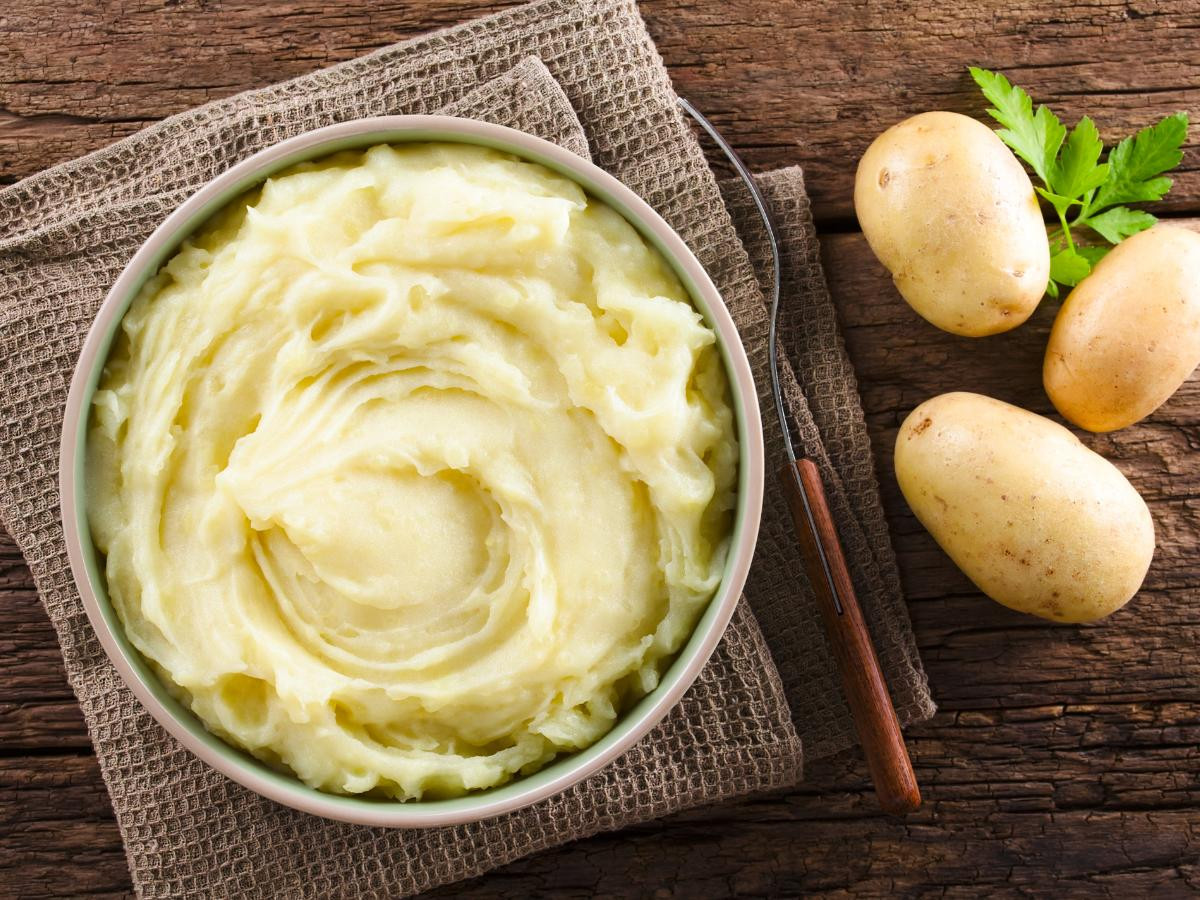
Imagine a symphony of flavors where fluffy mashed potatoes play a leading role in your eggless meatloaf masterpiece. Swap eggs for a cup of creamy mashed potatoes, and watch your meatloaf transform into a moist and hearty sensation. Not only does this substitute add richness, but it also brings a dose of potassium, vitamin C, and fiber to the table.
Substitute 1 cup of mashed potatoes for one egg. Ensure the mashed potatoes are well-cooked and smooth. Mix them thoroughly into the meat mixture to provide moisture and binding.
Nutritional Facts:
Potatoes are a good source of potassium, supporting heart health.
Vitamin C in potatoes boosts your immune system.
Fiber aids in digestion and promotes a feeling of fullness.
2. Potato Starch: The Unsung Hero of Moisture
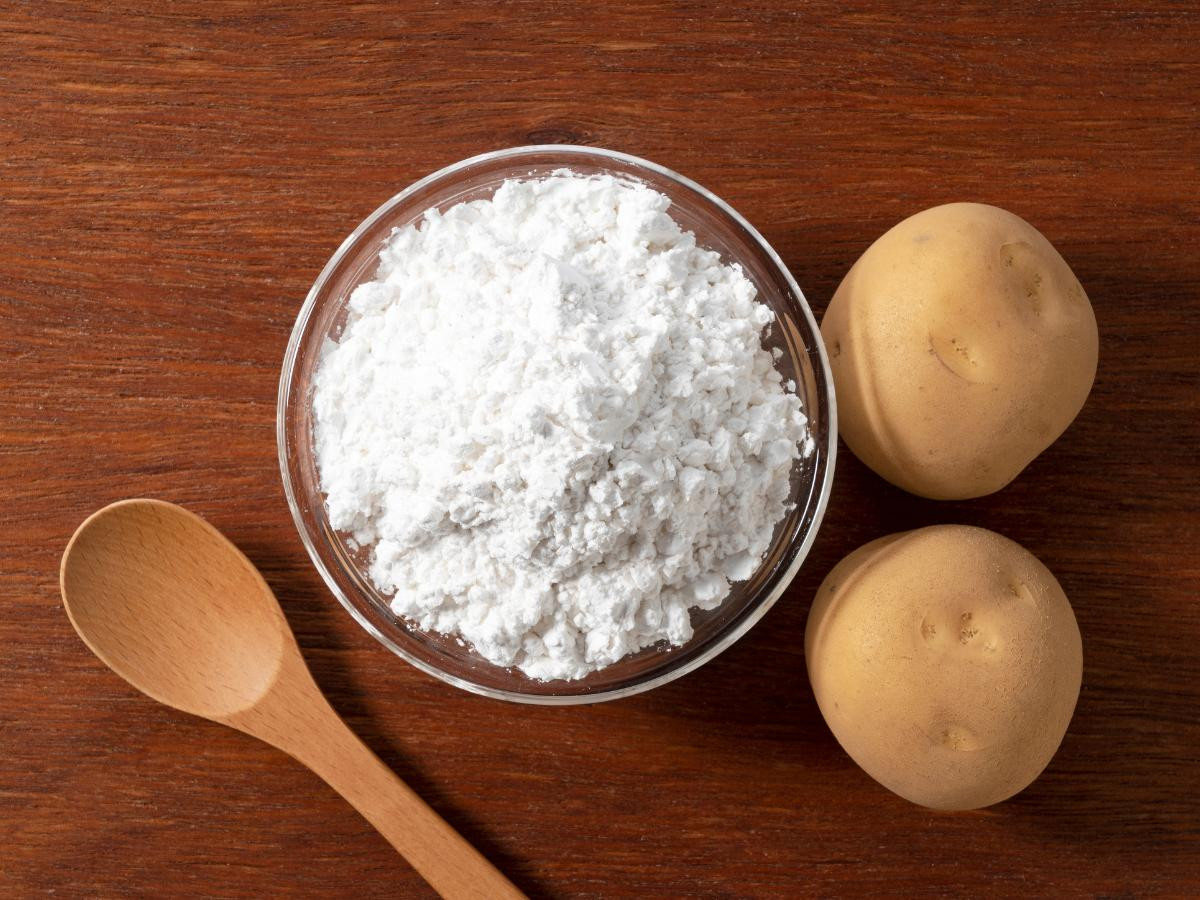
Enter potato starch, the unsung hero that champions moisture in your meatloaf. A couple of tablespoons can work wonders in binding ingredients, leaving you with a tender and flavorful dish.
Potato starch is a gluten-free option, making it suitable for those with dietary restrictions.
Use 1 to 2 tablespoons of potato starch per egg. Blend the potato starch with other dry ingredients before incorporating them into the meat mixture. This helps with binding and moisture retention.
Nutritional Facts:
Low in calories and fat.
Gluten-free, making it suitable for a variety of dietary needs.
Contains some essential minerals like iron and potassium.
3. Yogurt: Tangy Twist for Textural Triumph
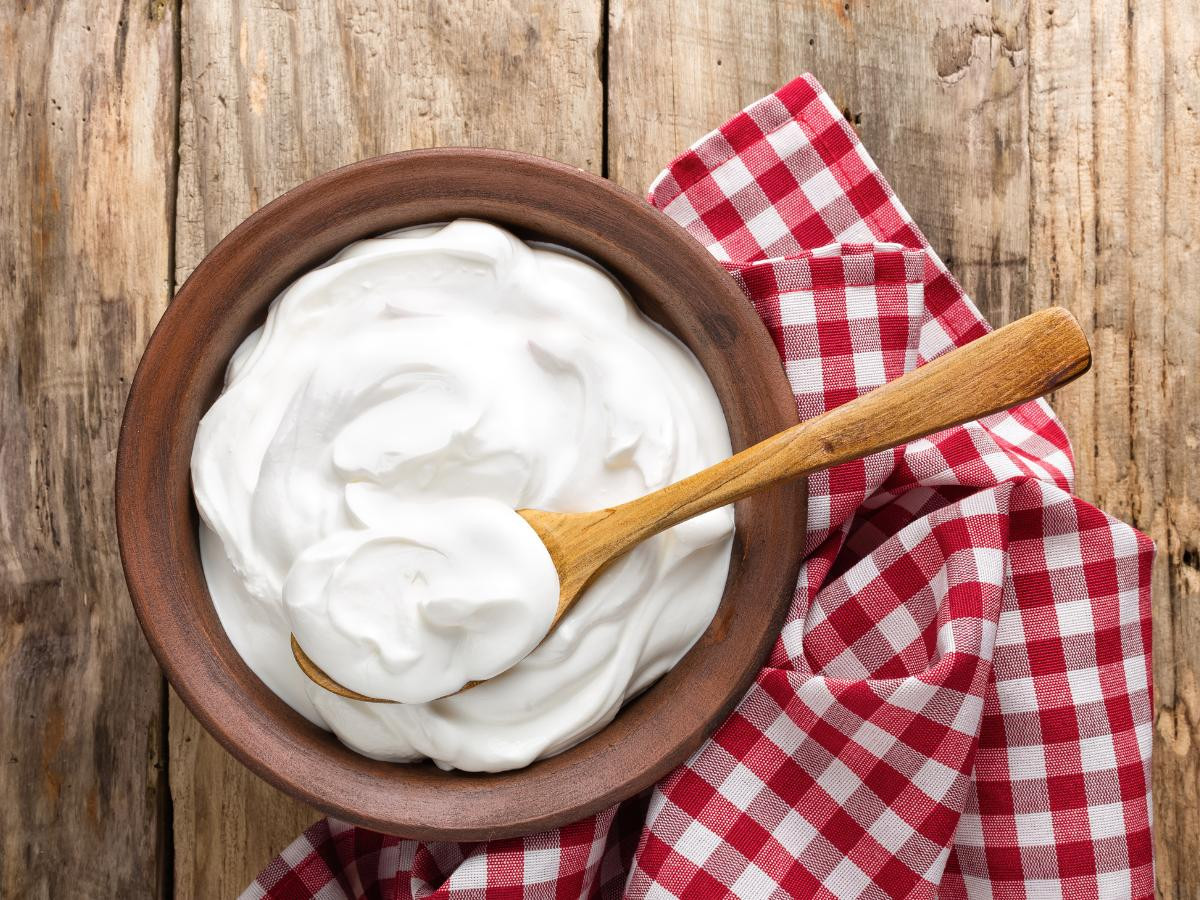
Dive into the world of dairy with yogurt, a tangy substitute that elevates the creaminess and texture of your meatloaf. Swap each egg for a quarter cup of plain yogurt and enjoy a melt-in-your-mouth goodness that adds a touch of acidity to the mix.
Yogurt also brings a dose of probiotics, benefiting your gut health.
Replace one egg with 1/4 cup of plain yogurt. Stir the yogurt into the meat mixture to enhance moisture and add a subtle tangy flavor.
Nutritional Facts:
Probiotics in yogurt support a healthy gut microbiome.
A good source of calcium for strong bones.
Adds protein without the cholesterol found in eggs.
4. Chickpea Flour: A Chickpea Fiesta in Every Bite
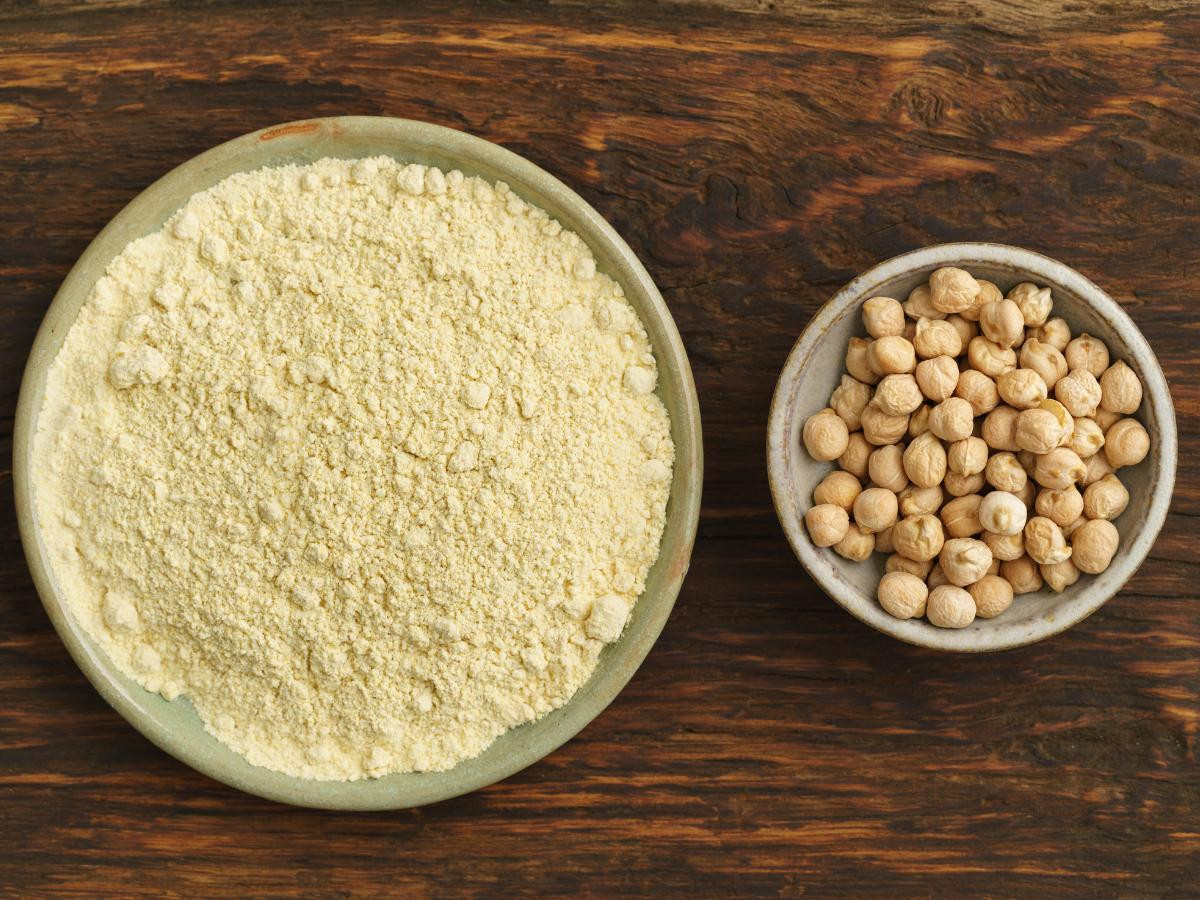
Let’s talk chickpea flour, the gluten-free champion of egg substitutes for meatloaf. With a cup of chickpea flour, your meatloaf becomes a celebration of flavors and textures. Not only is chickpea flour protein-packed, but it’s also rich in fiber, iron, and manganese, making it a nutritional powerhouse that is the perfect replacement for egg whites and egg yolks.
Use 1/4 cup of chickpea flour per egg. Mix the chickpea flour with warm water to form a smooth paste before adding it to the meatloaf mixture. This provides binding and adds a nutty flavor.
Nutritional Facts:
High in plant-based protein, supporting muscle health.
Rich in fiber, promoting digestive health.
Contains essential minerals like iron and manganese.
5. Flax and Chia Seeds: The Dynamic Duo of Binders
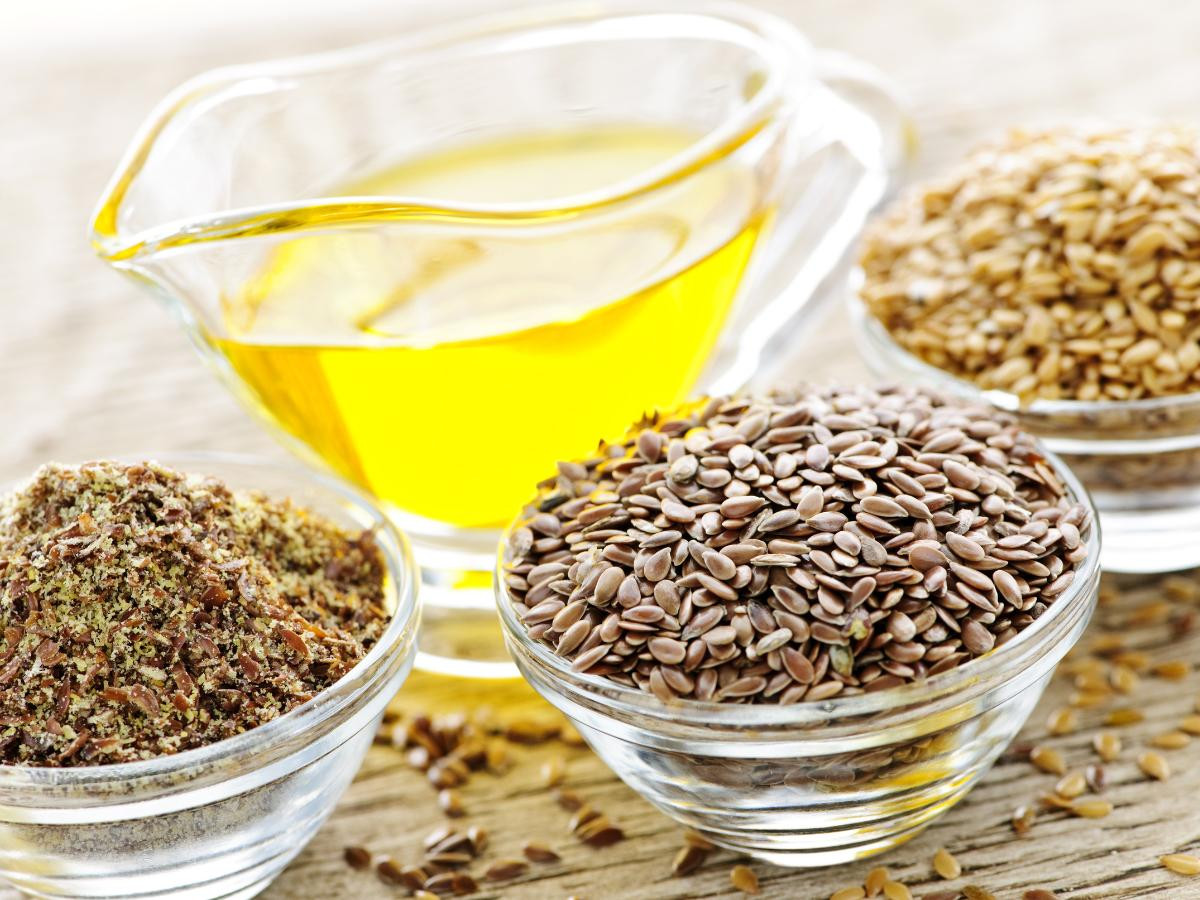
Step into the world of seeds with flax seeds and chia, the dynamic duo that elevates your meatloaf game. Mix one tablespoon of ground chia or flax seeds with three tablespoons of water for each egg, creating a gel-like binding agent.
These tiny powerhouses are rich in omega-3 fatty acids while also boasting in antioxidants and fiber.
Create a flax or chia seed “egg” by combining 1 tablespoon of ground seeds with 3 tablespoons of water for each egg. Let the mixture sit for a few minutes until it thickens, then incorporate it into the meat mixture for binding.
Nutritional Facts:
Omega-3 fatty acids in flax and chia seeds support heart health.
Antioxidants help protect cells from damage.
Fiber aids in digestion and promotes a feeling of fullness.
6. Mashed Banana or Avocado: Nature’s Sweet Embrace
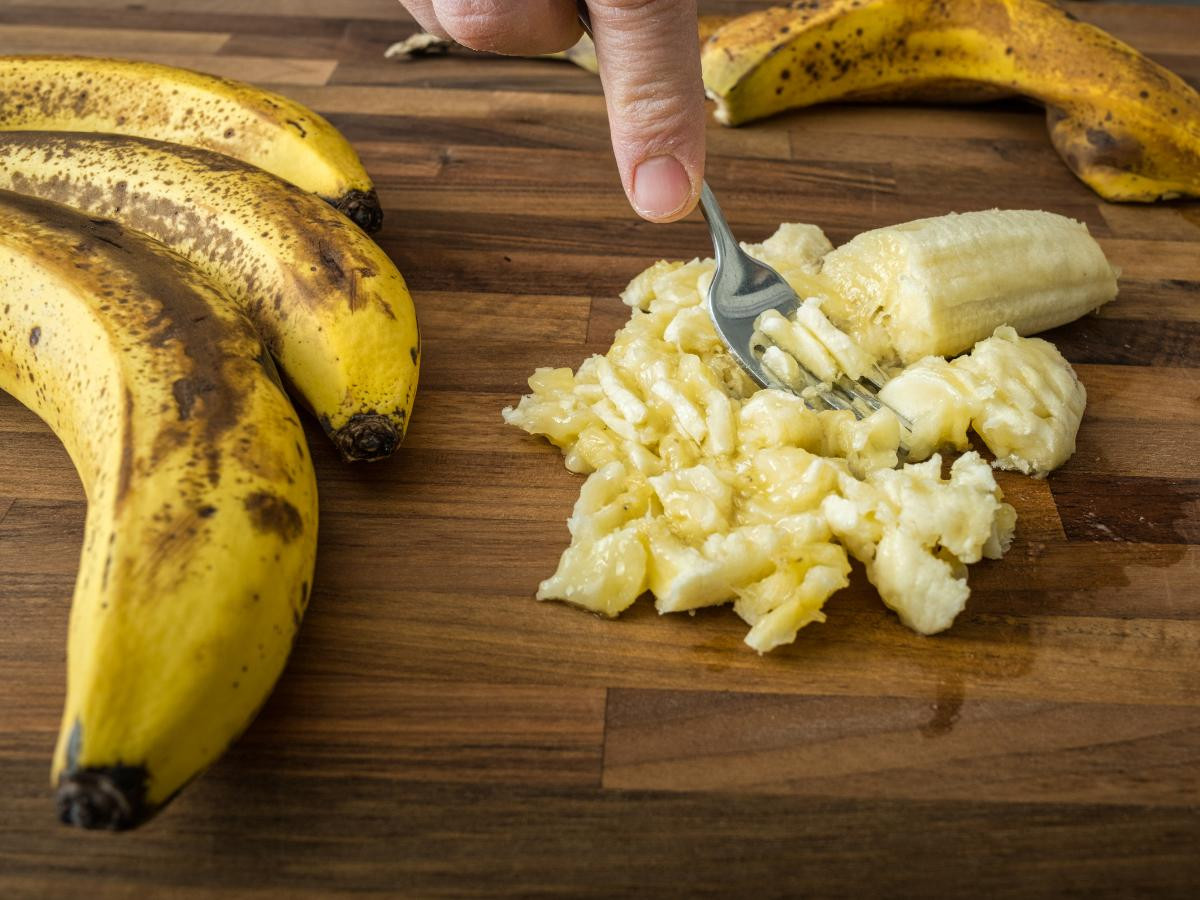
For those craving a touch of sweetness, mashed banana or avocado steps up to the plate. Replace each egg with a quarter cup of mashed goodness for a luscious and unique twist on your meatloaf.
The natural sweetness complements the savory notes, and you’ll enjoy added potassium, healthy fats, and vitamins.
Replace each egg with 1/4 cup of mashed banana or avocado. These alternatives add natural sweetness and moisture. Mix them thoroughly into the meat mixture.
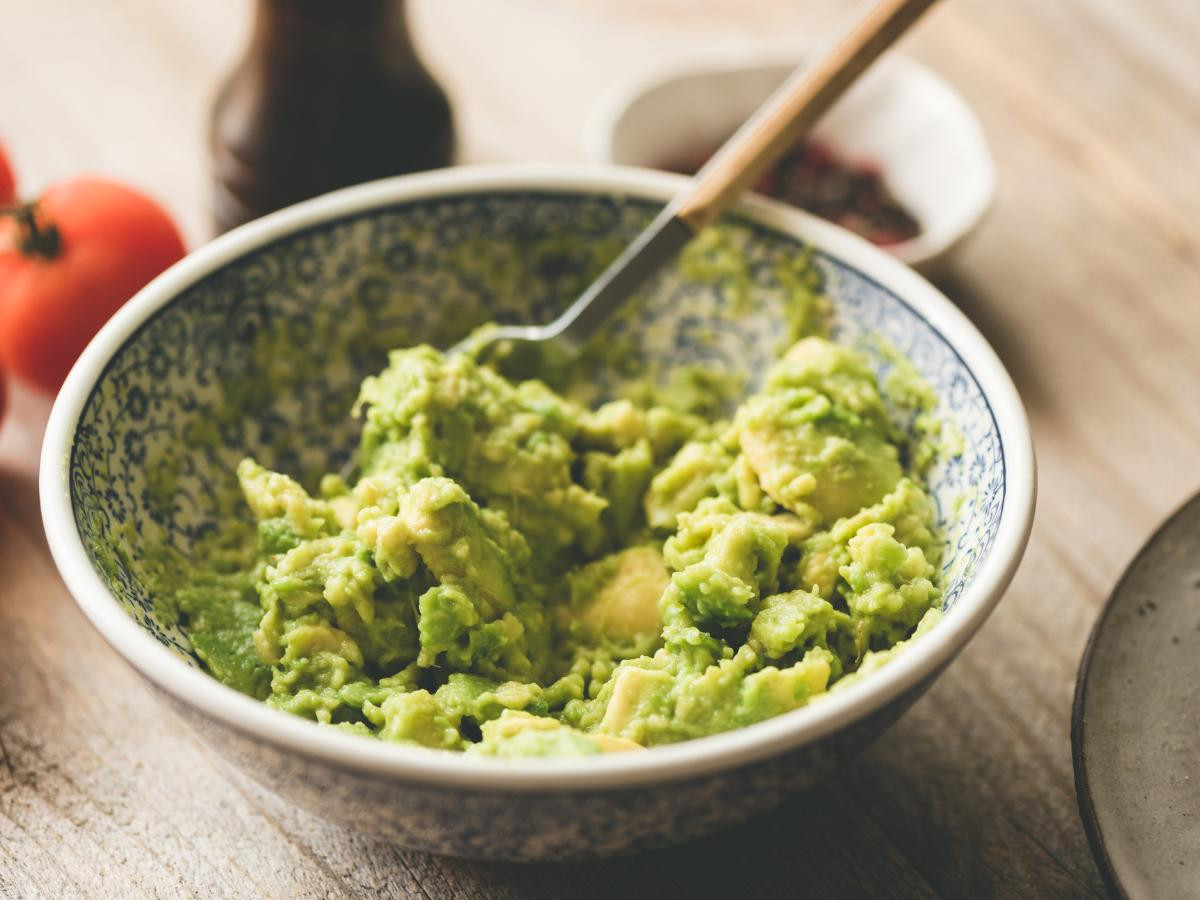
Nutritional Facts:
Bananas are a rich source of potassium, supporting heart health.
Avocado provides healthy monounsaturated fats and vitamins.
Both options contribute natural sugars for sweetness.
7. Tofu: The Plant-Based Powerhouse
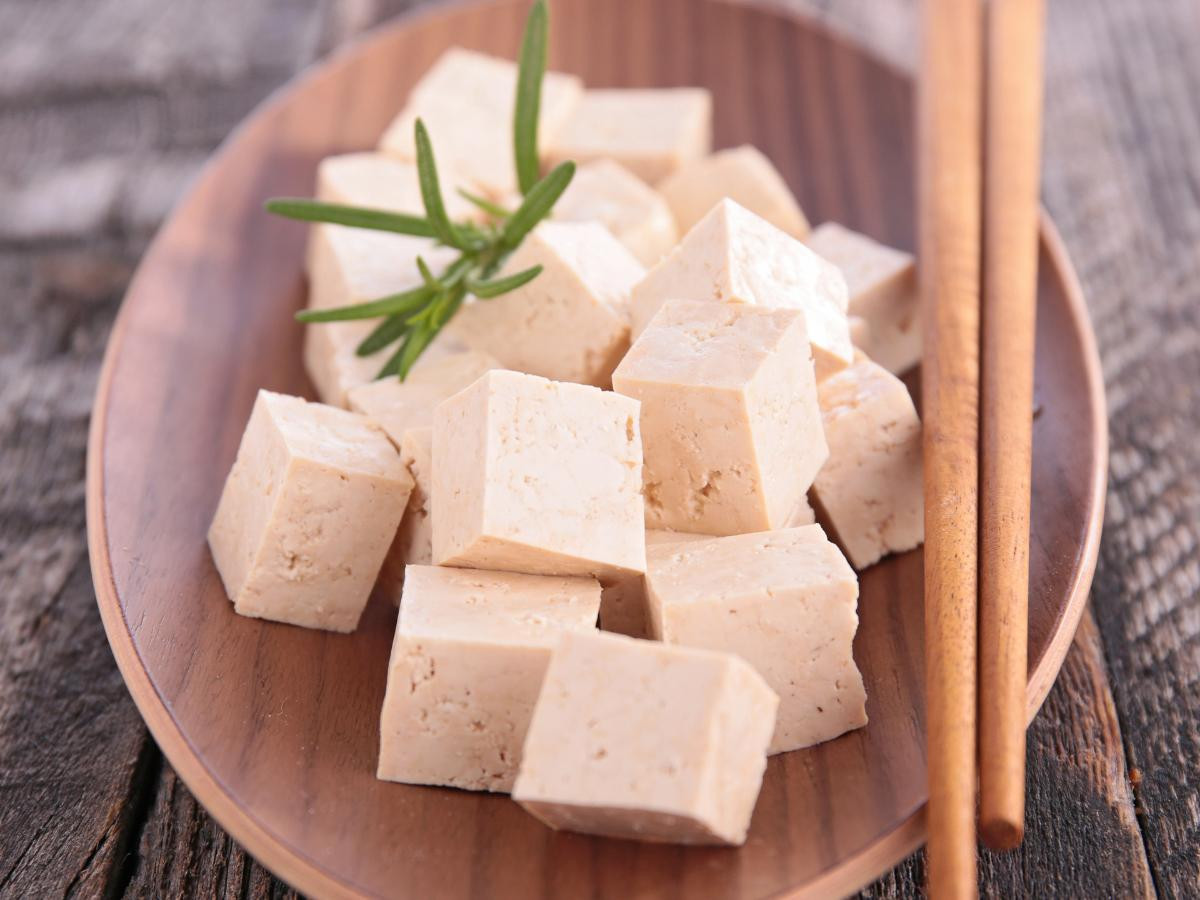
Embrace the plant-based goodness of tofu as your egg substitute for meatloaf. Blend a quarter cup of silken tofu until smooth to achieve a creamy texture that complements the meaty goodness.
Tofu is a great protein source and packs essential amino acids, iron, and calcium.
Blend 1/4 cup of silken tofu until smooth for each egg. Incorporate the blended tofu into the meat mixture, providing creaminess and binding properties.
Nutritional Facts:
High-quality plant-based protein supports muscle health.
Rich in essential amino acids.
Contains iron and calcium for overall health.
Honorable Mentions For Egg Substitutes:
Olive Oil:

While olive oil doesn’t directly replace the binding properties of eggs, it can contribute moisture and add a subtle richness to your meatloaf.
If you’re looking to reduce cholesterol or want a heart-healthy option, consider substituting 1/4 cup of olive oil for each egg. Drizzle the olive oil into the meat mixture and ensure it’s evenly distributed for enhanced flavor and moisture.
General Tips for Using Olive Oil:
Choose a high-quality, extra-virgin olive oil for the best flavor.
Gradually incorporate the olive oil into the meat mixture, adjusting the quantity based on your desired moisture level.
Be mindful of the flavor profile; olive oil can impart a distinctive taste, so consider its compatibility with the other ingredients in your meatloaf.
Consider Using Chunks of Fresh Bread or Bread crumbs to help bind the ground beef in your simple meatloaf recipe
Commercial Egg Replacers:
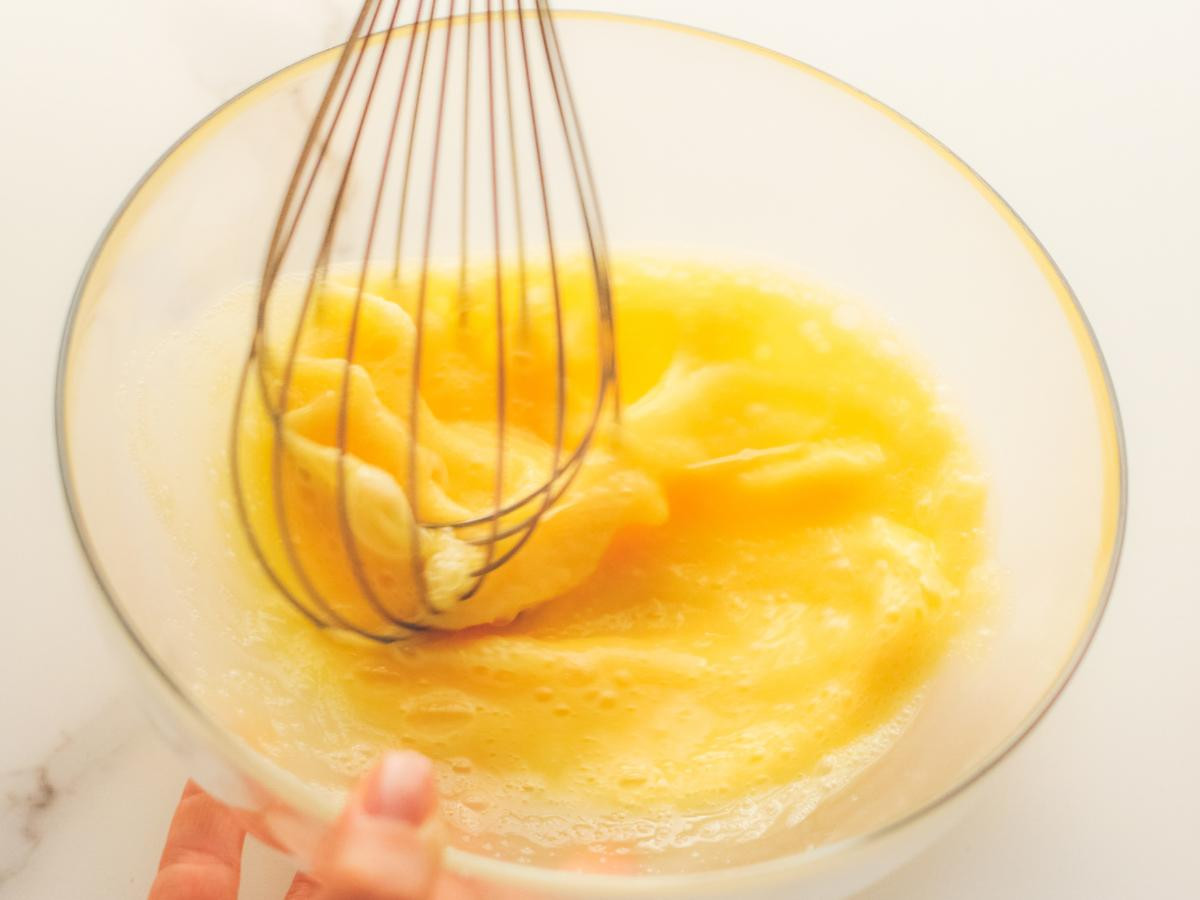
Commercial egg replacers in most grocery stores offer a convenient and reliable option for those seeking an egg-free meatloaf. These products are often formulated to mimic the binding properties of eggs and can be suitable for various dietary needs, including vegan and allergy-friendly alternatives.
Follow the package instructions to determine the appropriate amount for your meatloaf recipe, and incorporate it into the mixture as directed.
General Tips for Using Commercial Egg Replacers:
Different brands may have varying instructions, so carefully read and follow the package guidelines for the best results.
Some commercial egg replacers come in powder form and must be mixed with water, while others are ready-to-use liquid substitutes.
Experiment with different brands to find the suitable egg substitute and best fit for your taste preferences and dietary requirements.
Cracked The Code: In Summary
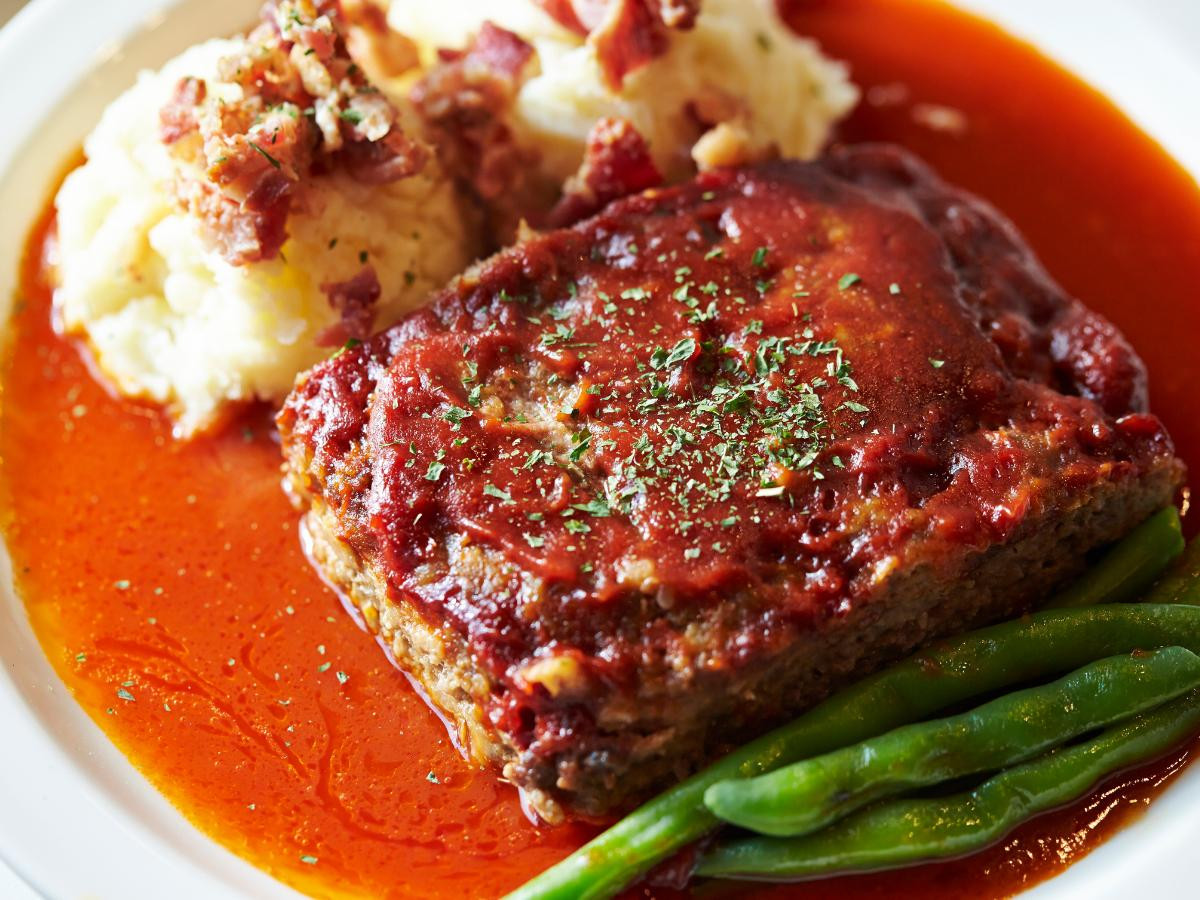
From unsweetened applesauce and mashed potatoes giving bread crumbs cozy comfort to the dynamic duo of flax egg and chia seeds showing off their binding prowess, we’ve explored a smorgasbord of egg substitute options that add a dash of creativity to our meaty masterpiece while replacing eggs but not flavor and nutrition.
Now, as you gear up to tackle your next vegan meatloaf creation, armed with mashed bananas, olive oil, bread crumbs, and perhaps a sprinkle of fairy dust (just kidding, unless you have some handy), remember that the kitchen is your playground.
Whether you’re dancing with dietary restrictions, experimenting with flavors for ground meat, or just trying to impress your taste buds, the world of egg substitutes is your oyster.
So go forth, my culinary comrades, and let your eggless meatloaf shine, bound together by the magic of egg alternatives.
FAQ and Additional Information
Easy Vegan Meatloaf Recipe:
2 cups cooked lentils (green or brown)
1 cup oats (rolled or quick oats)
1 onion, finely chopped
2 cloves garlic, minced
1 carrot, grated
1 celery stalk, finely chopped
1 cup tomato sauce
2 tablespoons soy sauce
1 tablespoon Worcestershire sauce (make sure it’s vegan)
1 teaspoon dried thyme
1 teaspoon dried oregano
Salt and pepper to taste
Olive oil for greasing
Glaze:
1/4 cup ketchup
1 tablespoon maple syrup or agave nectar
1 tablespoon balsamic vinegar
Instructions:
Preheat your oven to 375°F (190°C). Grease a loaf pan with olive oil.
In a large mixing bowl, combine the cooked lentils and oats. Mash the lentils slightly, leaving some texture.
Add the chopped onion, minced garlic, grated carrot, chopped celery, tomato sauce, soy sauce, Worcestershire sauce, thyme, oregano, salt, and pepper. Mix well until all ingredients are evenly combined.
Mix the ingredients for the glaze in a separate small bowl: ketchup, maple syrup or agave nectar, and balsamic vinegar.
Transfer the lentil mixture into the greased loaf pan, shaping it into a loaf.
Spread the glaze evenly over the top of the lentil mixture.
Bake in the oven for 45-50 minutes or until the top is golden brown and the loaf is firm.
Allow the vegan meatloaf to cool for a few minutes before slicing.
Can You Freeze Meatloaf?
You can freeze meatloaf! Freezing meatloaf is a convenient way to prepare meals in advance, saving time on busy days. Here’s a simple guide on how to freeze meatloaf properly:
Freezing Cooked Meatloaf:
1. Cooling: Allow the meatloaf to cool completely after baking. This prevents condensation, which can lead to freezer burn.
2. Slicing: Consider slicing the meatloaf before freezing. This way, you can thaw and reheat meatloaf in individual portions as needed.
3. Wrapping: Wrap the cooled meatloaf tightly in plastic wrap or aluminum foil. Ensure it’s well-sealed to prevent air and moisture from reaching the mouthwatering meatloaf.
4. Double Wrapping: You can place the wrapped meatloaf in a resealable plastic freezer bag for extra protection. Squeeze out as much air as possible before sealing.
5. Labeling: Clearly label the package with the date of preparation. This helps you track how long the meatloaf has been in the freezer.
6. Freezing: Place the wrapped meatloaf in the freezer. For optimal quality, consuming frozen meatloaf within 2-3 months is recommended.
Thawing and Reheating Cooked Meatloaf:
1. Thawing: To thaw the frozen meatloaf, transfer it to the refrigerator and let it thaw overnight. This gradual thawing helps maintain the meat’s quality.
2. Reheating: Reheat the thawed meatloaf in a preheated oven at 350°F (175°C) until it reaches the desired temperature. Covering it with foil can prevent it from drying out during reheating.
Freezing Uncooked Meatloaf:
1. Shaping: If you prefer freezing uncooked meatloaf, shape it into a loaf and wrap it in plastic wrap or foil. Ensure it’s tightly sealed.
2. Double Wrapping: Place the wrapped, uncooked meatloaf in a resealable plastic freezer bag for added protection.
3. Labeling: Label the package with the date of preparation.
4. Freezing: Freeze the uncooked meatloaf for up to 3-4 months.
Thawing and Cooking Uncooked Meatloaf:
1. Thawing: Thaw the uncooked meatloaf in the refrigerator overnight.
2. Baking: Once thawed, unwrap and place the meatloaf in a baking dish. Bake it according to your original recipe, adjusting the cooking time as needed.

